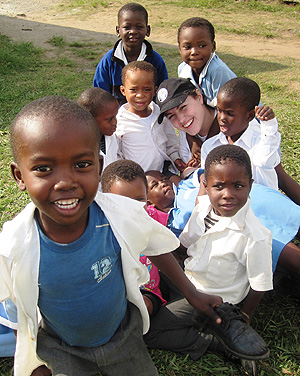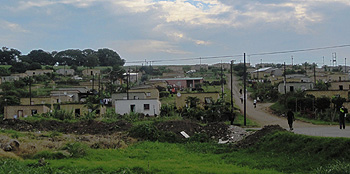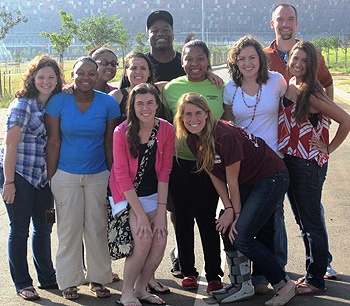Student Storyteller: Service trip guides career path
For most of my young adult life, I was sure that I would follow the straight and narrow career path. My talents were in marketing and advertising, and I thought I would march from undergraduate life to the corporate world after graduation. But my straight and narrow journey took a right turn in the summer of 2011 after I spent three weeks in Zinkwazi, South Africa.
I traveled with a group of 12 undergraduate students and one professor from Wake Forest on the Volunteer Service Corps’ Mission of Good Hope. Over the course of three weeks, our group taught at a local primary school in an impoverished town on the South African Coast. I had the wonderful opportunity to teach the kindergarteners and first graders.
 It was a challenge because the children primarily spoke their native language, Zulu, and I was instructed to help teach them English. After only a few days, my students were counting and learned their ABCs. It was so rewarding to watch them progress in only a short time.
It was a challenge because the children primarily spoke their native language, Zulu, and I was instructed to help teach them English. After only a few days, my students were counting and learned their ABCs. It was so rewarding to watch them progress in only a short time.
“The best thing that you can teach these students is that there is a world beyond their township and that education and hard work are ways to achieve beyond their current economic status,” said the school principal.
The community and teachers welcomed us into their school and were excited for Americans to visit their area. After seeing the level of poverty in the area and how much our impact on school children extends into their community, I began to gain a better understanding of the value of service.
While the students were not in school on Saturday, our group had the opportunity to visit the township where our students resided.
 “Welcome to the Zumani Township,” said our group tour guide, a native to the area. “Most of the families that live in this area barely can afford food for their families.”
“Welcome to the Zumani Township,” said our group tour guide, a native to the area. “Most of the families that live in this area barely can afford food for their families.”
Our white skin and nice tennis shoes made our group stick out like sore thumbs in the poverty-stricken South African town. But what stuck out to me was in the middle of the tiny one-room shacks, where families of five or more lived were shiny television sets.
The contrast of tribal art and barely clothed children to the sleek metal televisions in these homes was jarring.
“Most families purchase these sets as a status symbol, often spending beyond their means to keep up with their neighbors,” said the guide. “Many are desperate for media and news; others purchase just to show off their wealth.”
As the explanation rolled off the guide’s tongue in a thick Zulu accent, I felt my soul being pushed into that very moment. I had spent three years learning how to persuade and convince consumers to buy a product. Up until then, I was content with becoming an integral part in the consumerism in American and the world. In my black leather journal I scribbled, “I will never sell people things they don’t need.”
As we boarded the bus back to our lodging, down winding roads through rolling sugar cane fields I read the words over and over again. Was there not some other way to share news and information to people, other than forcing them to choose between feeding their families and purchasing a large appliance? If I’m not going to sell anything anymore, what am I going to do for the rest of my life?
These questions haunted me for the duration of the 15 hour-plane ride returning from South Africa. I was fidgeting with the card I had sent to friends and family that I had designed to raise money for my trip.
The front of the card read, “Each one should use whatever gift he has received to serve others, faithfully administering God’s grace in its various forms. 1 Peter 4:10.”
 I finally understood the meaning of the verse I selected to model my trip. I learned to recognize that although my talents were in advertising and marketing, I could use my gift for service and to make a difference in the world. I did not have to sell things for the rest of my life.
I finally understood the meaning of the verse I selected to model my trip. I learned to recognize that although my talents were in advertising and marketing, I could use my gift for service and to make a difference in the world. I did not have to sell things for the rest of my life.
Finding a career post-graduation is still a scary and overwhelming experience, but now I have an expectation for myself to work in field where I can use both my skills and my passion to help others. My job search for has included careers at a wide variety of nonprofit organizations and jobs related to corporate social responsibility.
Although the market is competitive, my experience abroad has shaped my approach to finding a career. I look forward to my future following my time here at Wake Forest, and I also am excited to begin a new adventure.
Categories: Experiential Learning, Global Wake Forest, Pro Humanitate, Research & Discovery, University Announcements
Media Contact
Wake Forest News
media@wfu.edu
336.758.5237



